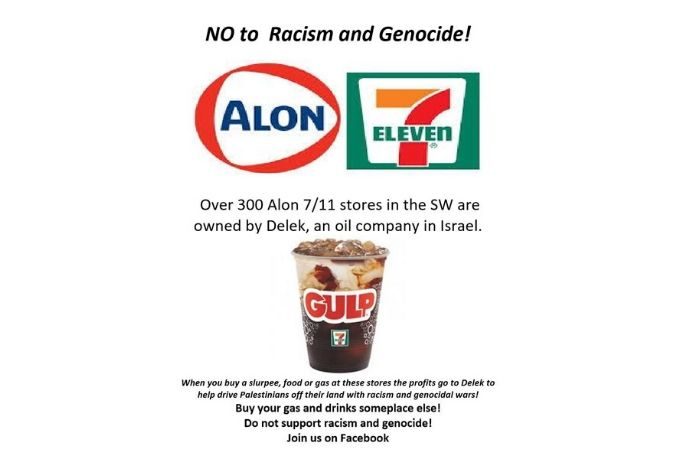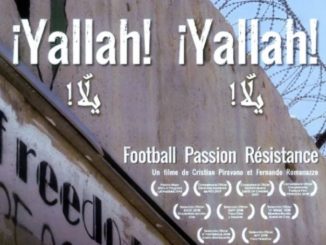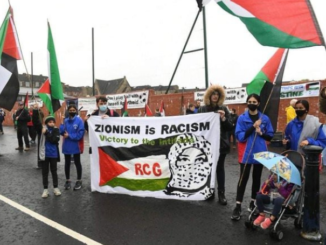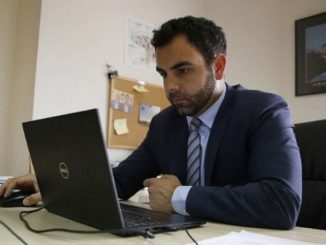
By Benay Blend
Several months ago my friend Bob Anderson (a long-time anti-war activist here in Albuquerque and also co-founder, along with his wife Jeanne Pahls, of Stop the War Machine) and I posted a Facebook page (No to Genocide. No to Hate: Boycott Alon/7 Eleven) dedicated to organizing a boycott of Alon/7-11, recently renamed Delek/DK.
Based on the principles of Boycott, Divestment, Sanctions (BDS), we also hoped to educate our communities about the ongoing Occupation. Thanks to If Americans Knew, we have flyers to hand out to families who live near Delek stations.
Because we are two aging activists based here in Albuquerque, New Mexico – not exactly the center of the world – I didn’t foresee that we would attract much attention. We both follow the stories of increasing harassment of Palestinians and their allies, particularly on college campuses where both of us ran into a fair amount of trouble ourselves.
Still, I was surprised when, on January 4, 2020, I received an email from the Michael Ralsky, public affairs lead for Delek US Holdings. “I would welcome the opportunity to speak with you about the boycott you appear to have organized,” he wrote. “It appears to be based upon some mistaken assumptions.” At that point, he offered to talk to me on the phone.
No. That is probably not going to happen. We temporarily took the page down to allow time to consider our best strategy in case we need to hire a lawyer. On the surface, the company’s claims that Delek US Holdings have “NO affiliations” with the Delek Group of Israel do not seem to hold up.
According to Wikipedia, Delek Group is an Israeli company which lists among its downstream holdings Delek U.S.:
Downstream—Delek Petroleum Ltd. [100%][11]
Unless there is a legal loophole that separates the two companies, I’m not sure how there could be no affiliation between the two. It’s true, as Mr. Ralsky said, that 100% of the gasoline sold at convenience stores operated by Delek US Holdings is sourced as well as refined in the United States. But I’m not sure how that defines the US branch as a separate entity with no affiliations in Israel.
It does, however, lead to another problem. A December 2019 article in Aljazeera focused on approval for the start of production at Israel’s Leviathan offshore gas field.
“A major blow to Israeli environmentalists and climate activists,” reports the AJE staff, because Texas-based Noble Energy and Israel’s Delek Drilling have already signed multibillion-dollar deals for exports to Egypt and Jordan, though the latter’s parliament recently passed a draft law banning the imports of Israeli gas to their country.
There are similar problems in the U.S. On August 30, 2019, the United States Environmental Protection Agency announced a settlement with Delek Logistics Operating, LLC, Delek Logistics Partners, LP, and SALA Gathering Systems, LLC (Delek) to resolve alleged violations relating to a 2013 oil spill from Delek’s oil storage and transfer station in Magnolia, Arkansas. Under the settlement, Delek will enhance environmental protections at its Magnolia facility and pay $2,255,460 in civil penalties.
As Anderson puts it:
“DK can pump oil in the Med Sea and sell it for a profit and it can also hold drilling rights in NM/Texas for drilling and selling in the U.S. – same company, just pumping oil regionally. This means something for neo-colonialism or the power of colonial Israel to exploit and market in the U.S. Something is significant about that.”
My first reaction to Ralsky’s email was along the lines of what terrible thing will happen next? After that, I started to realize that BDS really works, even on this very small-scale action. If the public affairs person at Delek went to the trouble of finding my email through Linkedin, I must have hit a nerve.
As far as any efforts to shut our boycott down, I don’t see this as foremost an abridgment of our free speech. The free speech focus has been a tactic on the part of liberal groups who want to attract a wider audience. Freedom to support pro-Palestinian causes without fear of harassment from Zionist groups, as well as government reprisal, is, of course, an important issue.
But for me, this strategy is problematic for several reasons. Most importantly, it places concerns of the dominant group at the center, our right to free speech, while Palestinians lack much more significant rights, including the fundamental rights listed in the BDS call to action:
1. Ending its occupation and colonization of all Arab lands and dismantling the Wall
2. Recognizing the fundamental rights of the Arab-Palestinian citizens of Israel to full equality; and
3. Respecting, protecting and promoting the rights of Palestinian refugees to return to their homes and properties as stipulated in UN resolution 194.
Moreover, liberal Zionist groups have supported freedom of speech in the past, perhaps because their interests are at the center. For example, in a press release last summer, JStreet saw no contradiction between supporting the “right of individuals, organizations and lawmakers [to] both oppose the Global BDS Movement and defend the right of Americans to actively support that or any other boycott movement.”
Indeed, as Adam Horowitz notes, the group has made good on its mission to undermine BDS, beginning as far back as 2009 by seeking to promote, in JStreet’s words, an “alternative on campus to the tired debate about the Israeli-Palestinian conflict.”
A way out of centering a strategy solely based on rights was offered two days ago by Haidar Eid. In an article titled “BDS Needs a Political Vision for Palestinian Statehood,” Eid advocates broadening the movement to include an end-game solution, specifically an “end of the occupation, rights for Palestinians in Israel and the right of return.” All would be part of a program along the lines of the One State Foundation, a group of academics and activists of which Eid was a cofounder.
This plan has several advantages. It goes beyond the two-state vision, which Eid claims is basically dead. It places Palestinians clearly at the center of the struggle, especially those who live between the Jordan River and the more than five million Palestinian refugees living in a Diaspora around the world.
Moreover, by spelling out all of the fallacies that led to two-states solution’s death, “progressive” groups who continue to oppose BDS would have to take a stand.
Do they truly support an end to the Occupation, or was that just lip service to put a kinder face on Zionism. Finally, it provides a vision of what a truly equal, secular state with equal rights for all might be. Ending with a quote from the late Edward Said, speaking to the Association of Arab-American University Graduates in Washington, DC in 1997, on the 80th anniversary of the Balfour Declaration:
“We cannot accept that the ‘redemption of the Jews’ required the dispossession of millions of Palestinian people. We must rethink our common past if we want to have a future, and it is time to honestly state that we are fated to have a common, not a separate, future.”
– Benay Blend earned her doctorate in American Studies from the University of New Mexico. Her scholarly works include Douglas Vakoch and Sam Mickey, Eds. (2017), “’Neither Homeland Nor Exile are Words’: ‘Situated Knowledge’ in the Works of Palestinian and Native American Writers”. She contributed this article to The Palestine Chronicle.

– Benay Blend earned her doctorate in American Studies from the University of New Mexico. Her scholarly works include Douglas Vakoch and Sam Mickey, Eds. (2017), “’Neither Homeland Nor Exile are Words’: ‘Situated Knowledge’ in the Works of Palestinian and Native American Writers”. She contributed this article to The Palestine Chronicle.







